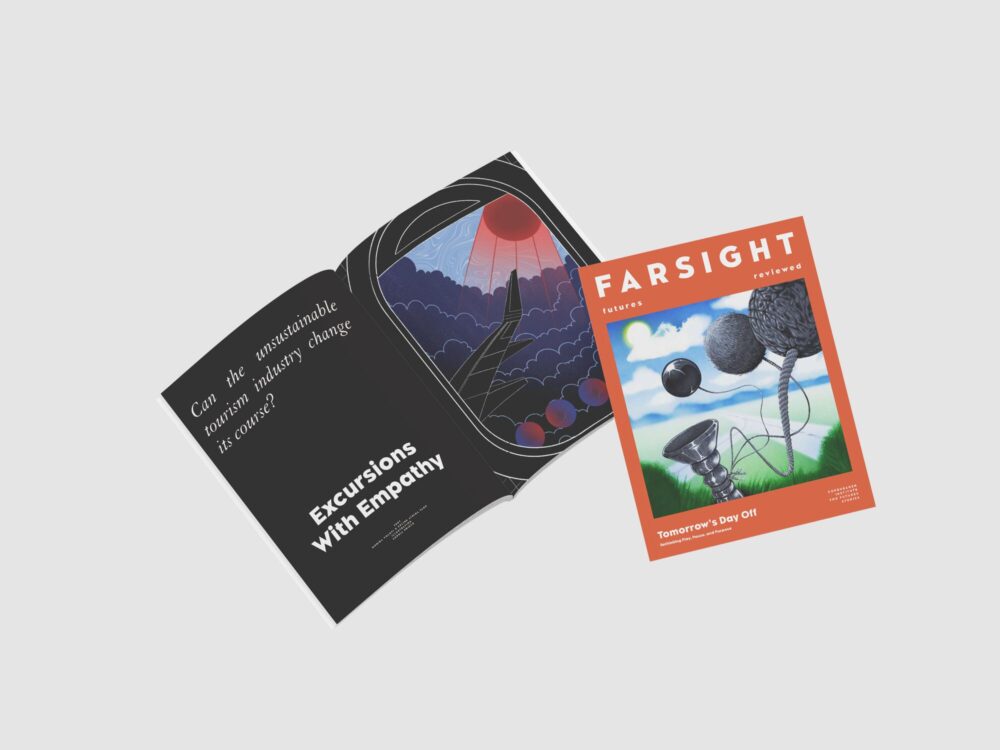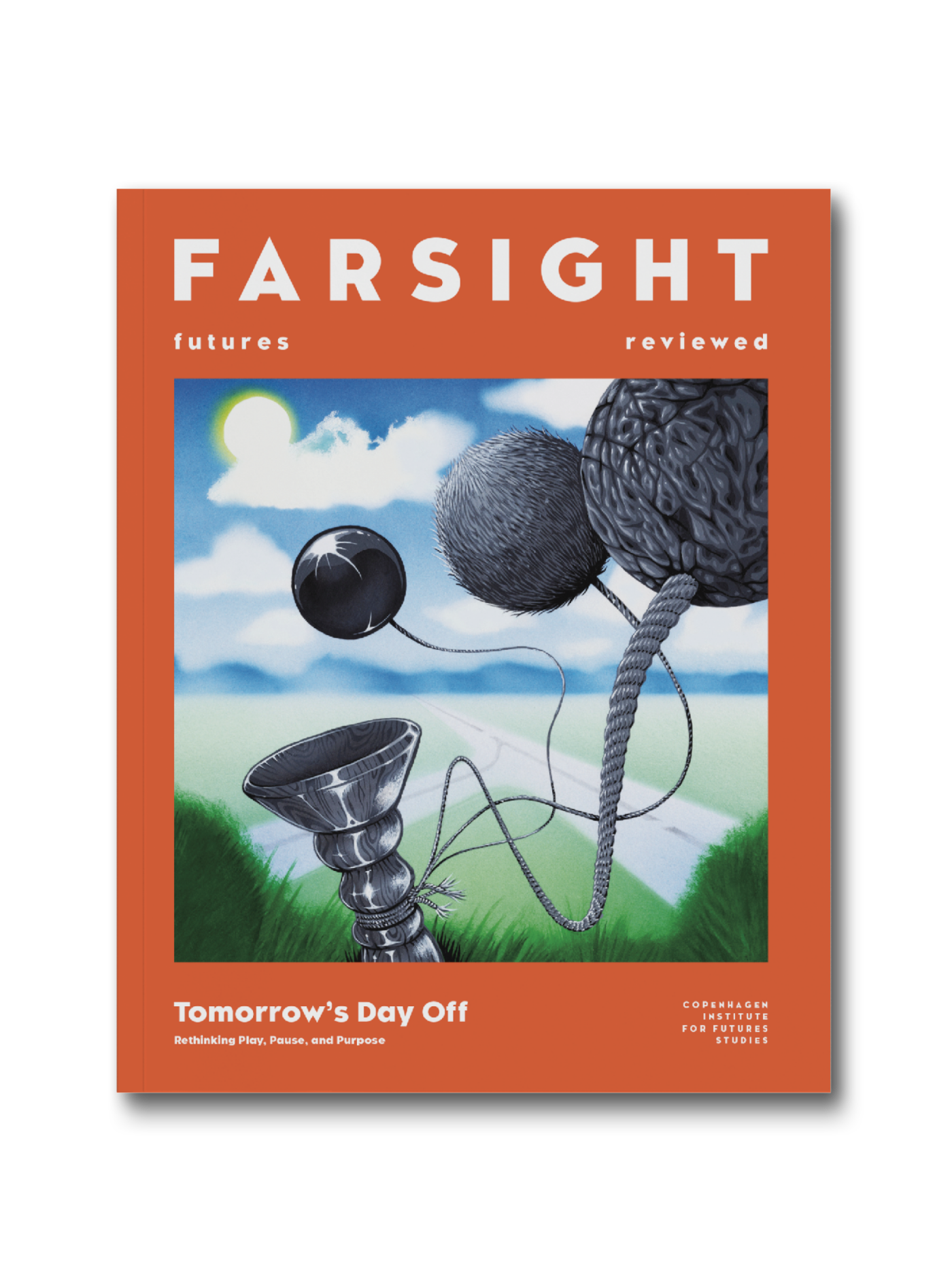
In turn, we use cookies to measure and obtain statistical data about the navigation of the users. You can configure and accept the use of the cookies, and modify your consent options, at any time.

Excursions With Empathy
Can the unsustainable tourism industry change its course?
Illustration: Sophia Prieto
Travelling is an essential part of modern life. A pastime of the masses that many of us use as a way to escape daily life, experience novelty, see new places, or to get out of our comfort zone. Yet what is not often recognised is the degree to which we, as tourists, have the power to fundamentally transform the destinations we travel to and the lives of the people who call those places home.
The importance of tourism for many countries’ economies is hard to overstate. Prior to the Covid-19 pandemic, the World Travel & Tourism Council has estimated the tourism sector accounted for 10.4% of global GDP. Between 2014 and 2019, travel and tourism accounted for as much as one in five new jobs created across the world. Yet all this also rests on a fragile foundation.

Broaden your horizons with a Futures Membership. Stay updated on key trends and developments through receiving quarterly issues of FARSIGHT, live Futures Seminars with futurists, training, and discounts on our courses.
become a futures memberThe pandemic, which all but halted international travel, gave rise to widespread uncertainty and speculation about what the future of tourism would be in a post-covid world. Would the threat of new infectious diseases or perhaps the consequences of climate change force us to travel less? Some even went as far as to speculate that we might begin exploring foreign countries and tourist hotspots virtually, through virtual reality. After all, technology might one day give you the experience of flying to a destination, walking through the streets of a city, interacting with locals, and taking in breathtaking views from the comfort of your own home.
Such expectations turned out to be short-lived. The pandemic only put a temporary damper on international travel, and despite the combination of accelerating climate change and general economic uncertainty, travellers continue to spend on flight tickets, hotels, and excursions like there is no tomorrow. In fact, the summer of 2023 may have seen the busiest single day in commercial aviation in history, with the global flight tracking service Flightradar24 estimating that as many as 134,386 flights were in the air July 6th, 2023.
Whether the post-covid spike in travel should be attributed to inflation incentivising people to spend their money quickly rather than saving up, or to how extended periods of lockdowns have created a sense of pent-up wanderlust – an urge to live the fullest today because you never know what happens tomorrow – it’s clear that the post-pandemic world of tourism has come to look much like that of the pre-pandemic world.
The resurgence of travelling has helped tourism-reliant economies on their way to recovery, but it has also served to reinforce the unsustainable foundation at the heart of the tourism industry, the success of which is measured economically with little regard to the negative impacts of tourism both on the climate and on local destination countries.
As Giang Phi, Professor of Tourism a nd Entrepreneurship at VinUniversity points out, “there’s what I would call an obsession with economic indicators in the tourism industry, at least here in Asia.”
“The focus is usually on how many tourists are coming, how much money they are spending, and how those amounts can be increased. It’s this mindset that prevents destinations from moving in a sustainable direction since economic concerns are often the only ones that dictate whether new hotels are built, airports are expanded, or neighbourhoods turned into resorts,” she explains. “The locals often don’t get a say in how things develop, and the environment tends to suffer as well.”
Phi has witnessed how the booming tourist industry in her native Vietnam has grown at the cost of locals, who often don’t see a significant share of the economic gains, while having to bear the negative consequences.
“Whether it’s removing trees to make room for a beachfront or directing the sewage of newly built hotels into the oceans, over the last 20 years there’s been a takeover of the private sector and a drive to create ‘artificial’ attraction at the expense of anything that’s natural.”
This issue of unsustainable development also extends to how travellers, when the identity of ‘tourist’ is taken on, tend to disregard many otherwise sustainable behaviours they might have gotten accustomed to at home.
“There’s this clash between being a tourist on one hand and being a sustainable consumer on the other. If you’re at home, you will want to turn off the light when you don’t need it, try not waste electricity and water, and so on. But the minute we go overseas and book into a hotel for instance, we tend to want to use the facility to the fullest since we’re paying for it. We allow ourselves to loosen our principles and enjoy wasteful luxury for a while,” she explains.
Considering these challenges, ‘sustainable tourism’ – the kind that doesn’t have a negative impact on local environments and economies – may seem like a far-fetched concept. In the Caribbean for instance, which is one of the most tourism-reliant regions in the world, the World Tourism Agency estimates that only 20% of the money spent by tourists go to local businesses and workers. The rest of it goes to foreign actors, usually from more developed economies that trade with or invest in the region.
‘Tourism leakage’, as this phenomenon is termed, is what prevents some tourism-reliant economies from reinvesting enough back into society to foster sustainable and equitable development. Add to this that the local populations also tend to have very little influence on the role that tourism plays in their lives.
“Responsible tourism can and should start with the needs of destination communities,” says Wes Espinosa, Interim Executive Director at the non-profit Center for Responsible Travel. “What we can do to work towards this is promote the model and idea of ‘destination stewardship’ – or an approach to managing tourism that balances the needs of visitors, residents, the environment, and the economy. Destination stewardship brings all community stakeholders to a shared tourism ‘management’ table to address challenges. If we don’t involve residents and communities, and we continue to take a volume-based approach to tourism, we’re not going to create meaningful change,” he says.
“Of course, every destination has its own unique challenges and as such, certain solutions should be based on a destination’s particular needs. But if you think about a popular destination like Cancun, Mexico, you see an example of unbalanced tourism where yes, local jobs are created, but a lot of the business ownership is international and environmental damage from over-tourism counteracts many of the positive economic benefits.”

Explore the world of tomorrow with handpicked articles by signing up to our monthly newsletter.
sign up hereCertainly, tourism done right can bring a lot of good to local economies, as well as other benefits like landmark protection and cultural exchange. It also doesn’t necessarily need to be environmentally destructive. It’s with such ideals in mind that a growing group of stakeholders in the tourism industry, ranging from local representatives to international organisations, are trying to push the future of tourism in a more equitable and sustainable direction. There’s a gathering momentum behind the idea of ‘regenerative tourism’, which aims to apply circular economy principles to the industry through initiatives like charging add-on fees used for community development or nature restoration, or using parts of the proceeds to finance zero-interest loans to local organisations, farms, or retailers that don’t necessarily benefit directly from tourism.
Many destinations have started to go down a similar road. The government of the Indonesian province Bali announced in May 2023 its wish to introduce a quota on the number of tourist arrivals on the island, promoting a quality over quantity approach. Chile is also working to minimise the negative impact of tourism through various initiatives such as the Torres del Paine Legacy Fund, which aims to restore natural ecosystems and promote community development within the Torres del Paine National Park. Turkey, another popular destination, is collaborating with the Global Sustainable Tourism Council (GSTC) to obtain improved eco-certifications for all the country’s hotels by 2030. The organisation has developed a list of criteria for sustainable tourism which emphasise effective sustainability planning, maximising social and economic benefits for the local community, enhancing cultural heritage, and reducing negative impacts to the environment.
“Turkey has 22.000 registered hotels. All of these must meet the demands of the certification by 2030 to be in accordance with the national programme. If they don’t, they may lose their license,” Mihee Kang, Global Assurance Program Director at GSTC, explains.
Efforts like these do not mean that the challenges related to unsustainable tourism will be solved anytime soon. And some come with the risk of greenwashing. If obtaining sustainable tourism certificates becomes the endgoal of a sustainable transition it risks taking the place of deeper structural change. But as Kang stresses, this kind of step-by-step encouragement is needed to push the industry forward.
“Part of it is branding. But what we’re seeing is that there is a high and growing demand for sustainability, so in order to keep up with other countries in the region, the certificate becomes a way for Turkey to showcase that they are moving in this direction. We have experienced how this has created more interest in other neighbouring countries who don’t want to be left behind.”
Some experts point to these kinds of shifts in demands from travellers as something that will enhance a much-needed transition toward more sustainable or regenerative forms of tourism. They believe the purchasing decisions and priorities of consumers, driven by changing mindsets and attitudes, will have a crucial part to play in pushing change in the industry.
“Changing traveller behaviour is quite complex. But there are different ways you can communicate to visitors to ensure that their expectations are aligned with your ambitions for sustainability,” Wes Espinosa explains. “How you market the experience is incredibly important. If you are just showing people a picture of a beach and a margarita, then people are more likely to arrive with this expectation.”
Getting destinations to move away from promoting sky-blue waters and images of cocktail-sipping travellers on beaches, and instead attempting to provide a realistic picture of the issues locals face because of tourism, may be a challenge. But it’s an approach that Espinosa and others hope will catch on, and which may eventually be accompanied by more dispersed tourism across destinations, a strengthening of local economies, and perhaps even the proliferation of an ‘ecotourist’ mindset among travellers. It also means encouraging travellers to reflect on why exactly we are travelling somewhere, how we would like to go about it, and what kind of footprint we would like to leave behind.
We will still want to travel in the future – and countries with tourism-reliant economies will still want us to – but we will need to do so without turning a blind eye to unseen costs of our seasonal getaways. This doesn’t necessarily mean we need to fundamentally reevaluate the purpose of travelling – novelty, escape, comfort – but to recognise the impact and power we exercise as tourists.
“Our reasons for travelling may or may not change in the future – but what can and should change is the way we travel,” Wes Espinosa says. “Our hope is that travel becomes less transactional, more holistic, and beneficial for destination communities. We want travel to take visitors’ impact into account, prioritise local needs and perspectives, and provide a pathway to environmental conservation.”
“Customers will need to share more of the economic burden of tourism,” says Mihee Kang. “I don’t see a future where travellers are forced to make the ‘right decisions’, but I do think more options should be given to tourists who are willing to search and buy more sustainable and responsible travel products and services.”

Read the latest issue of
FARSIGHT:
Tomorrow’s Day Off
Grab a copy here